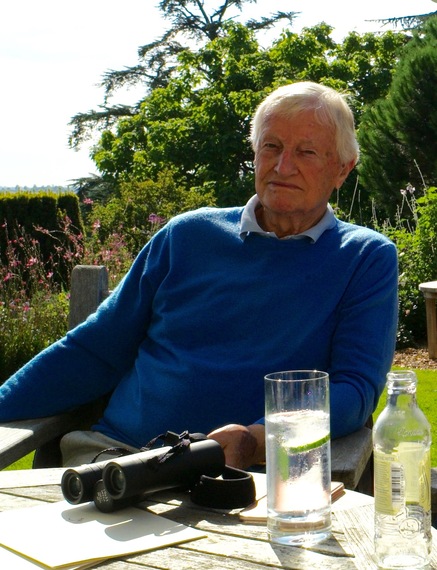
Pretty good shape for 90 - must be those G&Ts
Last week we celebrated my father-in-law's 90th birthday.
There was a time when even getting to 90 was a major achievement, and if someone were lucky enough to make it to 90, they were generally frail, wheelchair bound and barely aware of the celebration going on around them.
I remember when my great grandmother hit 90. She was in a nursing home, bent over, in a wheelchair. She barely knew where she was, or who she was. That was some time ago.
For my father-in-law, Ken Pattenden, nothing could be further from the truth. The man still stands a lean and wiry six foot plus (as I am only 5'6", I find this alone intimidating), has a full head of hair, a crushing handshake, an athlete's build and more than all his marbles. I suppose it's a tribute to genetics and clean living.
In any event, to celebrate the event, we all gathered in one of those massive old English country houses (did I mention that he lives in the UK?), and gathered the family for a weekend long party.
Ken was born in 1926, (you don't have to be a math major to have figured that one out), one year before Charles Lindbergh became the first person to fly across the Atlantic. Lindbergh's flight took 33½ hours in a tiny, one-seater, single engine plane made of wood and cloth, lacking even a front window. It was hailed as the 'wonder of the world'.
Our trans-Atlantic flight took about 6 hours. We slept most of the way in the reclining beds and we watched a movie. They also served us two meals. Lindbergh brought along some sandwiches.
The world has changed a lot since 1927, when Lindbergh made his historic flight. Sometimes, we lose sight of that.
This remarkable transformation, all of it, took place within my father-in-law's lifetime.
At dinner, I asked Ken about his experiences in the Second World War. He served in the British navy, assigned to Alexandria, in Egypt. At that time, Britain was still the British Empire and Britain ruled one-quarter of the world's surface and also ruled one-quarter of the world's population. Today, they are down to a few islands, and maybe Scotland, if they stay lucky.
But, prior to the war and signing up with the Navy, Ken had grown up and lived in London. This was during the Blitz, the German bombing of the city, and he recounted that as well - walking past houses that had been simply blown to oblivion overnight, and never knowing when or if you were going to get hit.
As we chatted, his wife of 60 plus years, Anne, who was sitting next to him also joined in.
She recalled that as a child in a small English village, they had no running water. Her mother had to go to the well in the center of the village and fill jugs each day. They had no central heating - all of the heat, and the cooking, was provided by an open fire. They had no indoor plumbing, but rather an outhouse behind the house. And no electricity, at least in the earliest days. They had no refrigerator, but instead an ice box that would, when it was available, be stocked with a block of ice to keep food cool.
She remembered the first car in the village, the first phone. She went on to become a head teacher. Ken became an accountant.
The transitions in the course of their lives, from the time they were born until the present is, well, mind-boggling. The changes they have seen and personally experienced represent a transformation so massive that, frankly, personal computers and iPhones (he is quite good with his), which we think of as major are, in fact, minor events.
When Ken and Anne were born, the world was, in many ways, far closer to what it had been for more than 500 years in the past, maybe a thousand. Most transport was done by animal power or walking. Agriculture was largely driven by animal power as well. Modern medicine was virtually unknown. You could die of a simple infection. Penicillin only came into public use in 1942! Last year Ken had laser cataract surgery and a few years before, an artificial replacement knee.
Automobiles, airplanes, telephones, refrigeration, running water, central heating, electricity, modern medicine, television, radio - the changes that their one lifetime has encompassed was probably the greatest transformation that any generation has ever seen, or for that matter, is ever likely to see.
We like to complain that 'things are bad'. This is particularly true in this election cycle. Things are terrible. Things have never been worse.
What we are lacking is a sense of history.
Talk to a 90 year old the next chance you get. I think you will see that things are not quite so bad after all.
-- This feed and its contents are the property of The Huffington Post, and use is subject to our terms. It may be used for personal consumption, but may not be distributed on a website.
No comments:
Post a Comment